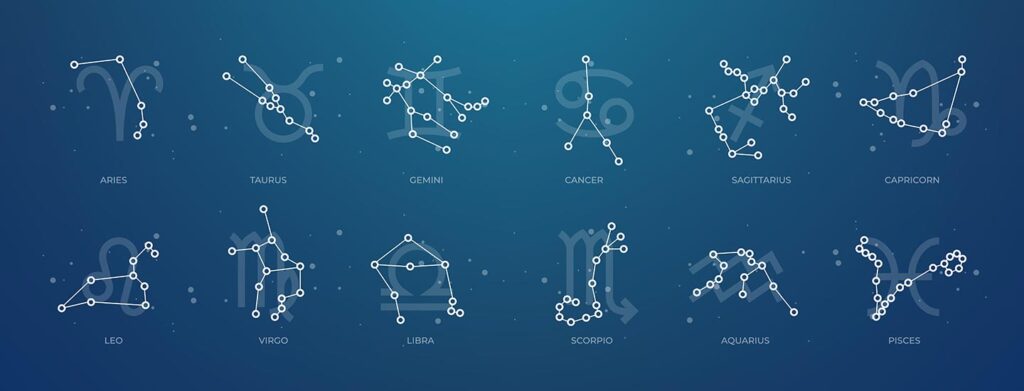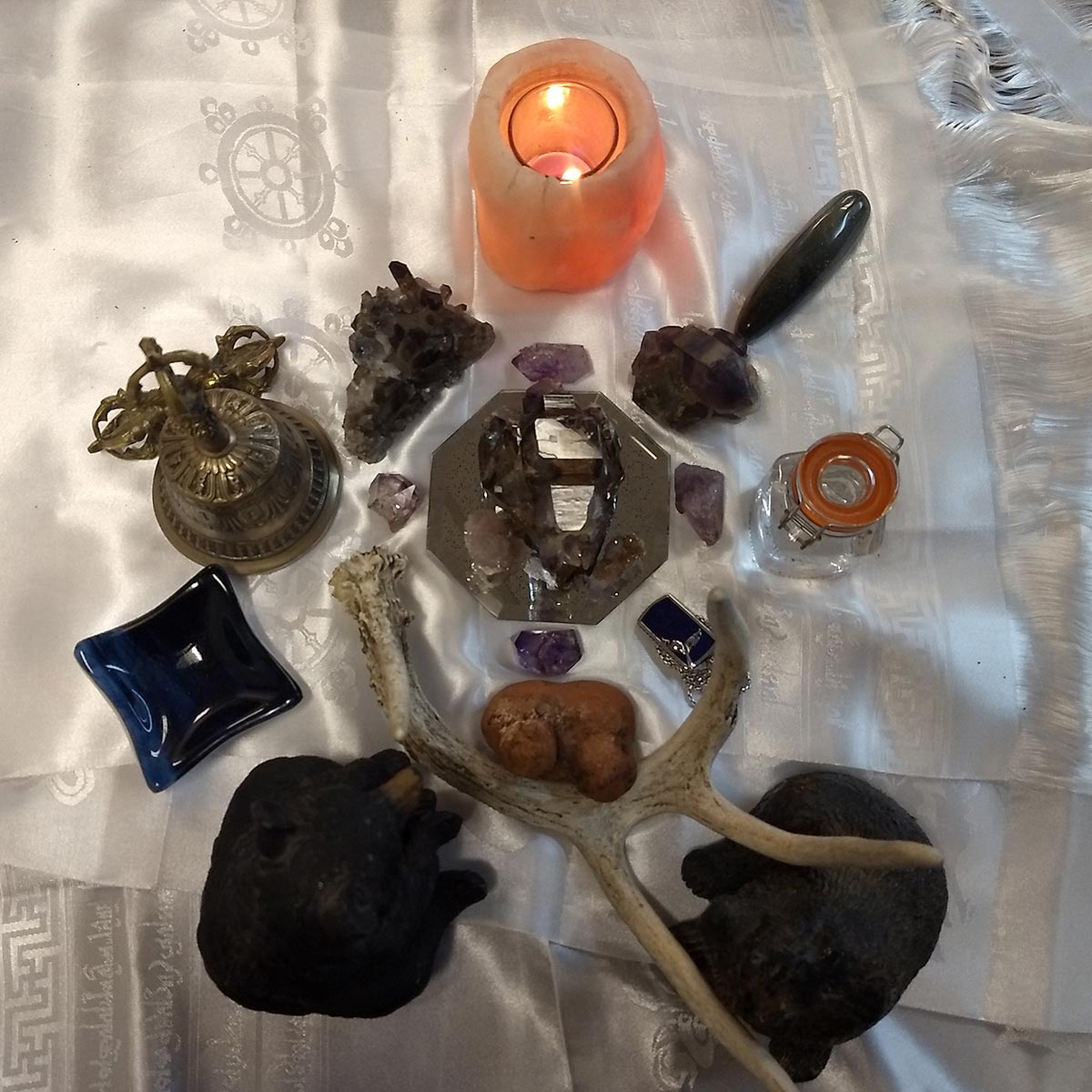In our ceaseless quest to understand the world around us and our place within it, humans have, for millennia, turned their gaze skyward. The celestial bodies — stars, planets, and the patterns they form — have inspired countless theories, myths, and systems of belief. Among these is the captivating and often misunderstood practice of astrology.
Contents
As an astrologer, I have dedicated countless hours (and more than a few sleepless nights) to the study and interpretation of astrological charts. I have explored the intricate dance of the planets and the subtle shifts in their positions. I have sought to understand how these celestial movements might influence our lives on earth.
Can we indeed use astrology to predict the future? Is it truly possible to divine our destinies from the stars?
These are the questions that drive my work, and these are the questions we will explore today. We will delve into the evidence (both for and against) this ancient practice’s predictive capacity, and attempt to unravel the complex tapestry of beliefs, theories, and scientific observations that surround it.
Whether you’re a seasoned astrologer yourself, a skeptic seeking to challenge your own views, or simply a curious mind eager to learn more about this fascinating subject, I invite you to join me on this exploration.
Although this article is about Predictive Astrology, you may want to read, “Astrology: Fact or Fiction?“
The History of Astrology and Future Prediction
Our journey into the understanding of astrology as a means to predict the future begins with a look back at its rich history. It’s fascinating, to say the least, that the practice of astrology has its roots traced back thousands of years, as far back as the ancient Mesopotamians. These early civilizations were known to keep detailed records of celestial events, linking them to earthly occurrences (be it the weather patterns, natural disasters, or even the rise and fall of kings). They strongly believed that the stars and planets held divine messages, and this belief formed the foundation of astrology as we know it today.
Fast forward to the Greco-Roman era, astrology had evolved to become a more sophisticated tool, used by philosophers and scholars such as Ptolemy. Ptolemy’s work, the ‘Tetrabiblos,’ is often cited as one of the pivotal texts in astrological history. His teachings advanced the idea that the movement and position of celestial bodies could influence individual lives and world events, hence forecasting the future.
“The celestial bodies are the cause of all that takes place in the sublunar world.”
~Ptolemy
However, the rise of Christianity and the scientific revolution challenged the validity of astrology. The Church denounced astrology as heresy, severing its ties with religion, while scientists questioned the lack of empirical evidence and the scientific basis of astrology.
Is Astrology Predictive?
Critics of astrology argue that there’s no scientific evidence to support the claim that astrology can predict the future. Astrology lacks the methodology that is characteristic of scientific disciplines (repeatability, falsifiability, and controlled experimentation). Furthermore, the concept of how celestial bodies, millions of miles away, can directly influence individual human lives is yet to be explained convincingly by astrologers.
On the other hand, advocates of astrology often counter these criticisms with the argument that astrology is more of a symbolic language or a form of art, rather than a science. They believe that astrology provides a framework for understanding human experiences and personality traits, based on the position of celestial bodies at the time of birth. Predictions, according to this view, are more about potentialities and propensities rather than fixed outcomes.
To be clear, astrology sets up the conditions from an energetic, geometric, and harmonic perspective. Interpretation of these conditions is honed through the practice of observation. However, there is a consciousness factor involved. By practicing interpretation, the ability of the practitioner is supported by the opening to divine information. This is a non-qualifying ability. You cannot measure it in a lab, and you cannot repeat the moment of interpretation and inspiration. This is the art of astrological chart interpretation. The science can only explain the planetary arrangement.
I highly recommend reading this article, “Not Being Limited by Scientific Explanation.”
The Evidence For and Against Astrology’s Predictive Ability
When we delve into the realm of astrology, we are exploring a field that is both ancient and controversial, a field that has inspired believers and skeptics alike throughout the centuries. The question we are investigating today is whether astrology has any predictive ability. Can the movements and positions of celestial bodies truly provide insight into our personal lives and predict future events? Let’s examine the evidence.
“Astrology is not a science; there’s no evidence that one’s zodiac sign actually correlates to personality.”
~Bill Nye, American science communicator
The Argument For Astrology’s Predictive Ability
Those who advocate for astrology’s predictive power often cite personal experiences and anecdotes in their defense. They argue that their horoscopes or astrological readings have accurately predicted personal events or personality traits (which, it should be noted, is a form of confirmation bias). They also argue that astrology has been used for thousands of years across different cultures, giving it a form of empirical validity. As we all know, ancient civilizations from the Mayans to the Chinese used forms of astrology to predict seasons, natural disasters, and even wars.
The Argument Against Astrology’s Predictive Ability
On the flip side, skeptics and scientists generally dismiss astrology’s predictive ability. They argue that there is no scientific evidence to support the claims of astrologers. Indeed, despite numerous studies, no conclusive scientific proof has been found to support the notion that the position of stars and planets at the time of birth can influence a person’s personality or predict future events.
One such study is the Mars Effect, which attempted to prove a correlation between the planet Mars’ position at birth and the likelihood of becoming a successful athlete. The study was widely criticized for its methodological flaws, and subsequent attempts to replicate its results have failed. As in any scientific discourse, the inability to replicate results is a significant red flag.
Furthermore, the fundamental premise of astrology – that celestial bodies can influence our lives – contradicts known laws of physics. To quote physicist and skeptic Lawrence Krauss, “The universe doesn’t care about us. That’s what science tells us. Any scheme that suggests otherwise is wishful thinking.”
While astrology continues to be popular and hold sway over many people’s lives and decisions, there is currently no scientific evidence to support its ability to predict the future. This lack of evidence, however, does not diminish its cultural significance or its role as a source of comfort and guidance for many people. As always, the key is to approach such matters with an open mind and a critical eye, never taking anything at face value without first examining the evidence (or lack thereof).
The Importance of Personal Interpretation in Astrology
There’s an intrinsic allure to the idea that the heavens, with their vast array of celestial bodies, hold the keys to our individual and collective futures. This belief underpins the ancient practice of astrology, which many people find compelling even today. Yet, when we delve into the heart of astrology, we find that it is not so much a predictive science as it is a tool for personal reflection and interpretation.
Personal interpretation plays a pivotal role in astrology. It is, in essence, the bridge that connects the symbolic language of the stars to our everyday lives. To understand why this is so, we must first grasp the fundamental mechanics of astrology.
Astrology, at its core, relies on the celestial bodies’ movements and positions at specific moments in time—for instance, the time of your birth (commonly known as your natal chart). It is the interpretation of these celestial patterns that forms the basis of astrological insights.
The Art of Interpretation in Astrology
Astrologers are akin to cosmic translators, interpreting the celestial language into something comprehensible and personally meaningful. This process involves a blend of learned symbolism, intuitive insight, and an understanding of human nature. It’s important to remember that each astrologer brings their unique perspective and interpretive lens to the process, making astrology a highly personal and subjective discipline.
It’s not unlike reading a poem, one might argue. While the words remain the same, the meaning derived can vary significantly from person to person, shaped by their personal experiences, beliefs, and perspectives.
Personal Interpretation and Predictive Astrology
“Astrology is a language. If you understand this language, the sky speaks to you.”
~Dane Rudhyar
When it comes to predictive astrology—using astrology to forecast future events—the role of personal interpretation becomes even more pronounced. The celestial patterns may suggest certain possibilities or trends, but how these play out in our lives hinges significantly on our personal interpretation and, ultimately, our free will.
This is why, despite the same astrological forecast, two people can have vastly different experiences. Our individual contexts, choices, and reactions shape the manifestation of these cosmic influences in our lives.
While astrology can offer valuable insights and potential forecasts, these are not definitive predictions etched in stone. Instead, they serve as guideposts, encouraging us to reflect on our paths, make conscious choices, and actively participate in shaping our futures.
Can Astrology Predict Death?
When it comes to the question of whether astrology can predict death, the answer isn’t as straightforward as one might hope. Astrology, as many know, is an ancient practice that deciphers the supposed influence of celestial bodies on human affairs. However, can it foresee the ultimate transition we all must face one day? Let’s delve into it.
Firstly, it’s important to understand (and I cannot stress this enough) that astrology is not an exact science. Many skeptics argue that its predictions are vague and could be interpreted in multiple ways, often leading to confirmation bias. In other words, you see what you want to see. Nonetheless, millions of people worldwide rely on it for guidance, comfort, and a sense of understanding the world around them.
Some astrologers claim that certain planetary aspects and transits (particularly those involving the 8th House, traditionally associated with death) could indicate potential health issues or even death. However, it’s crucial to remember that these interpretations are highly subjective and depend greatly on the astrologer’s skill and intuition.
“Astrology is a language that, if you understand this language, you can communicate with the universe.”
~Alejandro Jodorowsky
Moreover, even if certain aspects in a chart could potentially signify death, many astrologers refuse to make such predictions. The ethical implications are immense, as it could cause unnecessary fear and anxiety. Furthermore, since astrology isn’t 100% accurate, such predictions could potentially be false alarms, leading to unnecessary distress.
On the flip side, skeptics argue that any correlation between astrological charts and actual death incidences is merely coincidental. They contend that astrology is pseudoscience and its predictions can’t be scientifically proven. Furthermore, they often question the validity of the astrological concepts themselves, such as the 12 zodiac signs, the concept of houses, or the influence of planets on human lives. It’s a debate that has raged for millennia, and it’s unlikely to be resolved anytime soon.
Can Astrology Predict Child Birth?
As we venture deeper into the intricacies of astrology, the question inevitably arises: can astrology predict child birth? In my years of working with clients, I have come across a plethora of beliefs, theories, and interpretations. While some astrologers claim the ability to predict the occurrence of childbirth, the evidence supporting these claims is scant and, often, subjective.
The primary tool employed by astrologers in childbirth prediction is what’s known as a transit chart. This is a snapshot of the heavens at a particular point in time (often the moment of a person’s birth) and the way that the planets’ movements (or ‘transits’) interact with this chart is thought to be indicative of significant life events, including childbirth.
Further complicating matters is the fact that astrology is not a uniform discipline. There are many schools of thought within the astrology community, each with their own unique methods for interpreting astrological data. Some astrologers swear by the predictive power of transit charts, while others place more emphasis on progressions (a technique that involves advancing the positions of the planets and other celestial bodies in a person’s natal chart in order to predict future events and life phases).
When it comes to predicting childbirth specifically, the methods employed can be even more diverse. Some astrologers look to the Moon (which is associated with fertility and maternity in many astrological traditions) and its transits or progressions. Others may examine the fifth house of the natal chart (often associated with children and creativity) and any planets that reside there or make aspects to it.
Astrology Research Study
To further illustrate the lack of empirical evidence supporting astrology’s predictive powers, consider this: a study conducted in 1985 by Shawn Carlson and published in the journal Nature found that astrologers were unable to match natal charts with corresponding personality trait profiles any better than chance. However it’s important to note that the natal chart is far more revealing than a personality profile because a participant is asked to reveal what they know of themselves, whereas the chart reveals who that actually are. Many people are just not aware of themselves as much as they think they are.
Another study, conducted in 2001 by Geoffrey Dean, found similar results when astrologers were asked to match natal charts with corresponding events in people’s lives. Again, it’s critical to understand that the movement of the celestial bodies produces forces that increase or decrease thee flow of frequencies of vibration. These frequencies show what is or is not possible in human affairs. It doesn’t dictate what will happen, only the potential if the conditions are present.
Can Astrology Predict Marriage?
As a devotee of the celestial sciences, I’ve always been intrigued by the question: can astrology predict marriage? This curiosity often led me to delve deep into astrology charts, birth constellations, and planetary alignments. And what I’ve found is both fascinating and complex, yet it requires a nuanced understanding of the subject.
Firstly, astrology, at its core, is the study of celestial bodies and their influence on human lives (and not a rigid roadmap to your future). It’s a means to understand one’s personality traits, inherent tendencies, and potential opportunities or challenges. In this context, astrology can indeed provide insights into the nature of one’s marital prospects, the potential compatibility with a partner, and possibly even the timing of marriage. However, predicting marriage with absolute certainty is a proposition that might not hold water when scrutinized under the lens of scientific empiricism.
For most astrology systems, the seventh house in a horoscope chart (also known as the house of partnerships) and the planet Venus (signifying love and relationships) are critical indicators of marital prospects. If these are positively aligned, they could signify favorable outcomes in matters related to marriage.
Multidimensionality
However, astrology is not one-dimensional. A myriad of factors (ranging from the placement of various planets, their aspects, the strength of the house rulers, to the overall health of the chart) play a role in the final interpretation. Thus, while astrology can provide indications, it’s imperative to understand that these are generalizations and not sure-fire predictions.
This brings us to the crux of the matter—predictability. In the realm of science, predictability is premised on reproducible experiments and empirical evidence. Astrology, while rich in symbolism and archetypal wisdom, does not meet these stringent criteria. However, the premise of astrological chart factors signaling specific types of events has been monitored by thousands of astrologers for thousands of years. So, the scientific model of the last couple hundred years wouldn’t be the right model for testing astrology anyhow. It would be like using the scientific method for measuring the distance of ejected pebbles in the explosion of an atom bomb.
Interpreting Astrological Indicators
Understanding astrology requires a balanced perspective. It’s not about deterministic predictions, but rather about gaining insights into our inherent tendencies and potentialities. Astrology can guide us, provide a different lens to view our lives, but it does not dictate our future. We, as individuals, have the power to shape our destiny, and astrology can be a tool to help us navigate our journey.
So, to answer the question—can astrology predict marriage? Yes, and no. Yes, because it can give indications based on your birth chart, and no, because these are not definitive predictions. I believe the beauty of astrology lies not in the certainty it provides, but in the possibilities it opens up for exploration and introspection. It’s a tool for self-discovery, a guide to understanding ourselves better, and a map to navigate the celestial influence on our earthly existence. And it is fantastic at describing the type of relationship a couple may have based on how their natal charts interact with one another.
If you’re interested in having a compatibility chart done, contact me.
Can Astrology Predict If I Will Be Rich?
The question of whether astrology can predict wealth is a complex one, and one that I encounter frequently in my work as an astrologer. The answer is not as straightforward as one might hope, and it’s grounded in the intricate and multifaceted nature of astrology itself.
To understand this, it’s crucial to grasp that astrology doesn’t predict events in a direct, linear fashion (as one might expect from a weather forecast or a stock market analysis). Instead, astrology provides a framework for understanding the broader themes and patterns that might influence one’s life (including their financial prospects).
When it comes to predicting wealth, there are multiple astrological factors to consider:
- The Second House: In astrology, the Second House represents one’s personal assets (money, belongings, and general material wealth). A strong Second House (populated by beneficial planets or well-aspected) may suggest potential wealth.
- The Eighth House: This house governs “shared” wealth — inheritances, investments, financial gains from marriage, or business partnerships. A prominent Eighth House might indicate wealth acquired through these means.
- Jupiter and Venus: These are traditionally known as the “benefic” planets because of their associations with abundance and prosperity. Positive aspects to these planets, or their placement in key houses (like the Second or Eighth), may suggest financial success.
- Saturn: While Saturn is often viewed as a challenging planet, it’s also linked to long-term stability and discipline. A well-placed Saturn might indicate gradual but steady accumulation of wealth.
No Guarantees
However, keep in mind that these are just indicators, not guarantees. An astrologically “rich” chart doesn’t automatically equate to material wealth in reality. Instead, it suggests a potential for wealth, which can manifest in many ways (including inner richness or abundance of opportunities).
It is, therefore, more accurate to say that astrology can provide insights into our potential for wealth, rather than predicting outright whether or not we will be rich.
Moreover, it’s important to remember that astrology doesn’t operate in a vacuum. Our actions, choices, and attitudes play a significant role in shaping our financial destiny. Positive astrological indicators may provide a conducive environment for wealth accumulation, but it’s ultimately up to the individual to leverage these energies effectively.
While astrology can offer valuable insights into the potential for wealth, it should never replace sound financial planning and responsible money management. Wealth is more often the result of smart decisions, hard work, and a little bit of luck, than the stars’ alignment.
I’ve conducted a year-long program called Building a Sacred Business in which I used astrology to help business owners plan appropriately for the businesses. If you’re interested in more on the subject, read “Better Customers, Wiser Business Growth With Astrology.”
In Conclusion
I personally know the amazing accuracy of a natal chart and the effect of transiting planets upon it. I’ve studied charts since the 1980’s, and I can say that specificity and generality are both present in the chart. I’ve even been able to track Bitcoin ups and downs which is really fascinating.
If you’re interested in having a chart done, contact me.
This is just a few areas that astrology addresses, and there are others. I suggest reading, “Astrology is Amazing, Wanna Know Why?“











